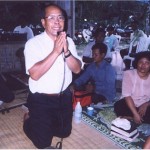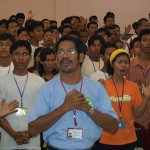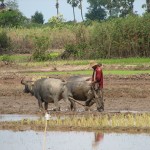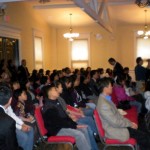August 25, 2009
When Churches Get Short Term Mission Right
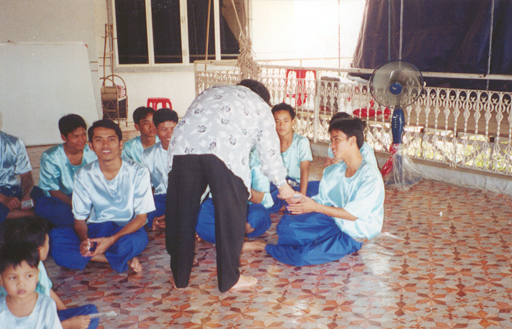 Judy learned a new term when she was in Cambodia; “Donor Driven.” This means that many projects on the mission field are often the idea of well meaning churches that come occasionally from overseas to do short term missions in a foreign country. Even though ideas for projects by foreigners are ill conceived or uninformed, nationals will never say no to funding because it means they can pay their staff and keep them employed longer, especially in developing countries where jobs are scarce and unemployment is a major concern.
Judy learned a new term when she was in Cambodia; “Donor Driven.” This means that many projects on the mission field are often the idea of well meaning churches that come occasionally from overseas to do short term missions in a foreign country. Even though ideas for projects by foreigners are ill conceived or uninformed, nationals will never say no to funding because it means they can pay their staff and keep them employed longer, especially in developing countries where jobs are scarce and unemployment is a major concern.
Foreign missionaries who set up short-term trips have difficulty saying no as well, and often rationalize agreeing to projects that are not really all that helpful. They can usually negotiate additional for funding for what they want to do as long as they agree to do the projects suggested by overseas churches.
In both cases, well meaning short-term mission people come and impose their enlightened ideas on those who really know the situation on the ground. Time and money is wasted on the project for both missionary and the nationals. The down time of those on the ground who facilitate short-term missions is also a concern, especially when groups want to ‘come and do.’ Often missionaries have to come up with busy work. In the long run, all he money spent in airfare for a short-term mission trips could have fed a village for two years to five years. From YWAM DTS young people sitting in front of the Prime Minister’s house singing and playing Christian music on their guitars, to a short-term Korean Youth Group sitting on the heads of statues of Buddha at Angkor Wat, the reputation of long term missionaries is often put at risk from such groups.
In 1999, Brian Sellers-Petersen of World Vision-US initiated a partnership with Seattle Churches; First Pres of Bellevue, Westminster Chapel, and Overlake Church. The idea was for these churches to support World Vision Cambodia through their Child Sponsorship Program and engage in mission/vision trips to see how their dollars are used on the ground. A vision trip was planned and the group made a trip to Cambodia through World Vision on January 26, 2000. Those mission pastors attending were Mark Carlson (Westminster), Rich Leatherberry (FPCB), Jeff McKinley (OLC) and Ron Vignec from the Lutheran-Episcopal church in Tacoma. Other WV-US staff, including the brain-child (Brian Sellers-Petersen) of the partnership, and Jim Schmick, Seller-Petersen’s replacement came along on this prototypical vision trip. Four of the five pastors were rather tall and large and loomed over Cambodians as giants.
The partnership with these churches focused on child sponsorship in the province of Kompong Thom[1], spiritual nurture of WV Cambodia staff also in Kompong Thom, and WVC’s Training of Timothies Project (TOT –directed by Dr. Russ Bowers), which was geared to bring unity to Cambodia’s divided churches through the training of their pastors.
Over the next few years, what we then called the Eastside Consortium (ESC) came to do vision trips which included the group’s involvement in teaching WVC staff in Phnom Penh, Kompong Thom, and pastors from around the country in the Training of Timothies project.
Almost from the beginning, the ESC morphed constantly. After a few years, Overlake decided they preferred a more Evangelistic approach of doing crusades and preaching to the multitudes. OLC left the consortium in 2003 which was about the same time Westminster’s Mission Pastor Mark Carlson left to work for the US Embassy in China. The ESC began to run out of steam with the loss of Overlake and Westminster’s Mark Carlson but WV-US World Vision Church Relations officer Jim Schmick urged Rich Leatherberry, John Meisel, and Lynn Ogata, all from FPBC, to stay committed. John organized a medical conference in 2004 at the World Vision central office in Phnom Penh which was a great success but almost too much work and effort to do consistently. During the conference, Rich Leatherberry and his watchdog, Steve Roberts met with the WVC Leadership and decided that they would continue to support child sponsorship and Training of Timothies but would cease to do mission trips through World Vision as it was just too unwieldy. With various building projects underway at FBCB, it was Lynn Ogata and John Meisel who carried the ESC through the next phase of uncertainly.
Meanwhile, Judy and the team at Calvin were researching and undergoing quite a process of discernment to see if Calvin was ready to adopt an Unreached Peoples Group. Possibilities were Cameroon, Kyrgyzstan and Cambodia. Cambodia was eventually selected. Jeremy and Maria Chase’s plans for serving there might have tipped the scales. Judy contacted area churches to find out who was involved in Cambodia and found Lynn Ogata at FPBC who Judy invited to come and give a presentation on Cambodia. Judy managed to get some Calvin members to accompany folk from FPBC on a fact-finding trip to Cambodia in early 2006. Since then, the passion and progress of ESC as a partnership has blossomed in many ways.
Early on, Pastors Rich Leatherberry (FPCB), Mark Carlson (Westminster) and FPBC missions elder Lynn Ogata established a foundation for ESC based on the principles of learning, listening, partnering, and sensitivity to the culture. Focus on relationships over projects, programs and buildings were priority. Their first concern was the Cambodian church, its unity and leadership development. When WVC’s investment in the church became nebulous, Pastor Leatherberry[2] and his growling watchdog decided to cease doing missions through WVC, and instead found missional venues in Cambodia where the ESC could be of real help-EFC KEY, Andong Village, Tong Neak Village, CSI clinic, a dorm in Kompong Thom, and TAP a modified version of TOT. TAP, directed by Raju Sbagwat, is a joint venture between the International Christian Fellowship (ICF) and World Vision Cambodia.
After a well thought out process of discernment, Calvin joined ESC at Pastor Leatherberry’s invitation and joined them on a mission trip in early 2006. Calvin’s passion for Cambodia, which was ignited on this trip, carried the partnership through tough times until Lynn Ogata agreed to spend a year and half in Cambodia. Lynn’s experience on the ground complimented Calvin’s passions and the ESC reached equilibrium for a first time in a long time.
Factors which make the ESC a successful mission partnership are attitude, perspective, and the spiritual maturity of the leaders. ESC leadership shares a holistic perspective toward mission that values word, deed, sign and life. They are sensitive when seeking to cross cultural boundaries and always defer to the nationals and long time people on the ground before making any major decision concerning engaging in, or supporting projects. They have a Kingdom perspective seeing God’s agenda as anything that can be reconciled to God, including souls, systems, environment, and things seen and unseen.[3]
Having worked as facilitator for this group for over eight years, I applaud the sacrifices, the passion, and good work that the partnership has done over years. The addition of Calvin to the partnership was a real shot in the arm. Because of the support of the ESC, emerging leaders through EFC KEY[4] and upper tier leaders through TAP will be mentored and developed. The poorest of the poor in Andong Refugee Village will survive to live another day, and the rural village of Tong Neak has become more self sustainable. For someone who has seen it all, this is pretty good stuff.
[1] A province right in the middle of Cambodia. Kompong Thom means ‘big province.’
[2] ESC at that time was only FPBC and although they stopped mission trips through WV, they continued to support Child Sponsorship.
[3] Colossians 1:19, 20.
[4] KEY- Kingdom Equipped Youth. TAP- Timothies All Project.
Provided by Brian Maher.
Written by: Cambodianchristian.Com
Trackback URL: http://www.cambodianchristian.com/article/wp-trackback.php?p=50
